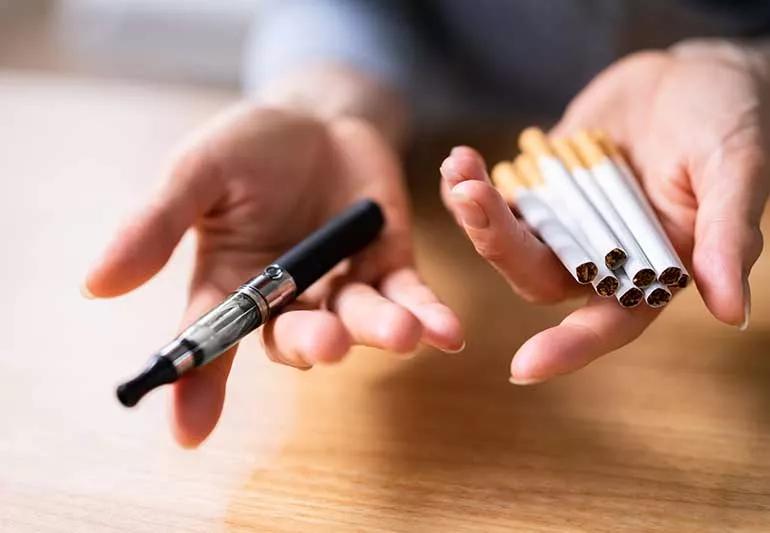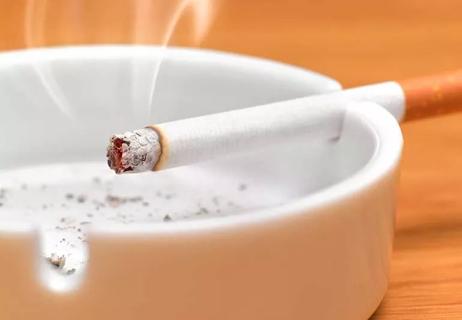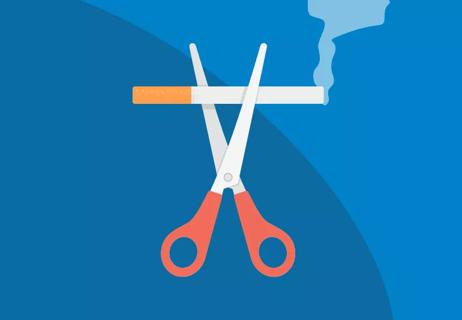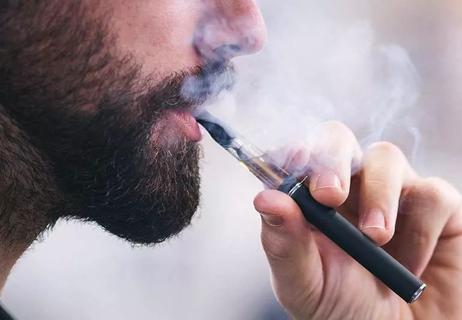Smoking and vaping deplete oxygen-rich blood that you need for endurance and fitness

Smoking cigarettes affects many aspects of your body, including your physical endurance. If you smoke, you get less oxygen in your heart, lungs and muscles. This reduces your physical fitness level. It can also cause inflammation in your bones and joints that may contribute to other conditions like osteoporosis.
Advertisement
Cleveland Clinic is a non-profit academic medical center. Advertising on our site helps support our mission. We do not endorse non-Cleveland Clinic products or services. Policy
Contrary to some popular beliefs, vaping isn’t a safe alternative to smoking. In fact, researchers say the rise of vaping “threatens five decades of progress in the fight against tobacco use.”
Research from the Centers for Disease Control and Prevention (CDC) shows the vast majority of vapes sold in the U.S. include nicotine, long known to be a dangerous and addictive chemical. And because vapes can be used more discreetly — including indoors and other places where traditional cigarettes are banned — people who vape can inadvertently consume even more nicotine and other dangerous chemicals than people who smoke cigarettes, says pulmonologist Humberto Choi, MD.
Vaping is on the rise, particularly among teenagers and young adults. Studies have shown that vaping among young people has risen from about 1% in 2011 to a whopping 21% in 2018.
“What we know for sure is that vaping use is not safe,” Dr. Choi says. “A question that we still have to answer is what the long-term consequences of vaping use will be. We know, though, that in the short term, vaping does have the potential to cause a lot of lung damage, a lot of lung injury and inflammation.”
With vaping on the rise, you may be wondering how it affects your well-being. Long-term research is still in its infancy — e-cigarettes have only been available in the U.S. since about 2007 — but there are significant lessons to be learned about vaping based on the dangers of cigarette smoking, which have been understood for decades.
Advertisement
Dr. Choi helps to unpack the physical effects of smoking and vaping.
The dangers of cigarettes can accumulate over time, often starting as more minor concerns and growing over the years into highly dangerous medical conditions, Dr. Choi says.
“What we see with cigarette smoking is that often, people don’t have major problems right away,” he continues. “But I see a lot of patients who later come in with chronic obstructive pulmonary disease (COPD) or lung cancer. They often have the story that they smoked for 20 or 30 plus years, often starting when they were teenagers, which is what we are seeing now with vaping on the rise among young people.”
The CDC says the long-term effects of smoking cigarettes include an increased risk of:
Smoking causes both immediate and long-standing effects on exercise and physical activity. In terms of exercise and physical activity, people who smoke tend to have:
Similar effects are likely similar for many people who vape. Like inhaling cigarette smoke, vaping can cause coughing and chest pain or tightness. (Not exactly the kind of symptoms that will help you run that extra lap or increase your energy to do a few more reps in the gym.)
“Some people have this idea that nicotine can be used as almost like a stimulant to enhance exercise performance — that is definitely a misconception,” Dr. Choi says. “Smoking and vaping are not something that is encouraged to use at all, especially if you’re worried about your exercise performance.”
To achieve peak performance, your heart, lungs and muscles need oxygen-rich blood. When you inhale tobacco smoke, carbon monoxide binds to red blood cells. As a result, oxygen is displaced, which reduces the amount of oxygen that’s delivered to your muscles and other body tissues. This causes an increase in lactic acid (the substance that causes muscles to feel as if they’re burning), fatigue and heavier breathing, as well as increased soreness after exercise.
This decrease in oxygen reduces your physical endurance, making it more difficult to do well in sports. It makes it harder to do everyday things, too, like walking up stairs. In addition, if you smoke, your resting heart rate is higher than that of someone who doesn't smoke due to decreases in oxygenation. This means your heart needs to work harder to deliver enough oxygen to your body, making you tire out more quickly during exercise or sports.
Advertisement
Research shows that vape products tend to expose users to lower levels of carbon monoxide than traditional cigarettes do. But they also found that vaping may still expose you to higher levels of carbon monoxide than recommended.
In a study of U.S. Army soldiers, vape users’ two-mile run was 27 seconds slower than those of people who didn't smoke. They also performed fewer sit-ups and push-ups than people who didn't smoke.
Some people begin — or continue — smoking as a weight control measure. But the reality is that smoking’s negative effects far outweigh any potential for weight loss that can come from smoking. This is particularly true because people who smoke are less likely to be physically active.
A good diet and exercise routine is the best way to achieve and maintain a healthy weight, Dr. Choi says.
“We know that from cigarettes when someone’s trying to quit, that one of the potential side effects of that process is weight gain, but not necessarily because you’re using it are you’re going to have weight loss, though,” he adds. “It’s a far reach to consider weight loss a benefit of smoking or vaping.”
Smoking and vaping among teens and preteens can also slow down lung growth, impair lung function and cause their hearts to beat faster than people who don't smoke.
Advertisement
Teens and preteens who smoke and vapes tend to experience the same negative effects of tobacco as adults who smoke, such as:
Nicotine is a dangerous and highly addictive chemical. Quitting vaping and smoking isn’t easy. Many people who smoke require multiple techniques to find what works for them, and relapses are common, Dr. Choi notes.
“Even when someone stops smoking, it’s often an active continued process to continue to not use cigarettes. And the same thing is for vaping,” he adds.
It can be done, though. Talk with a healthcare provider about the best options for you to quit smoking or vaping. They may prescribe medication, nicotine replacement therapy or other options.
Advertisement
Learn more about our editorial process.
Advertisement

Vaping exposes you to thousands of chemicals, including many that are known to cause cancer and lung disease

Smoking can make symptoms from cancer treatment worse, and can even make treatments less effective

From dental diseases to cardiovascular problems, the harmful effects of smoking hookah have plenty of downsides for your health

Even only a couple cigarettes a day can lead to potentially deadly lung diseases like COPD and emphysema

Your risk goes down once you quit, but you may still need a lung cancer screening

Cigarettes increase your risk of developing the condition and worsening its effects

Health benefits start within 20 minutes and continue to grow for years after

Each comes with substantial health risks and should be avoided

The tropical fruit is a good source of antioxidants and vitamin C

Most people fall asleep within 10 to 20 minutes, but if your experience is different, adjusting your sleep schedule may help

Exploring your hidden side can lead to better understanding of what makes you tick